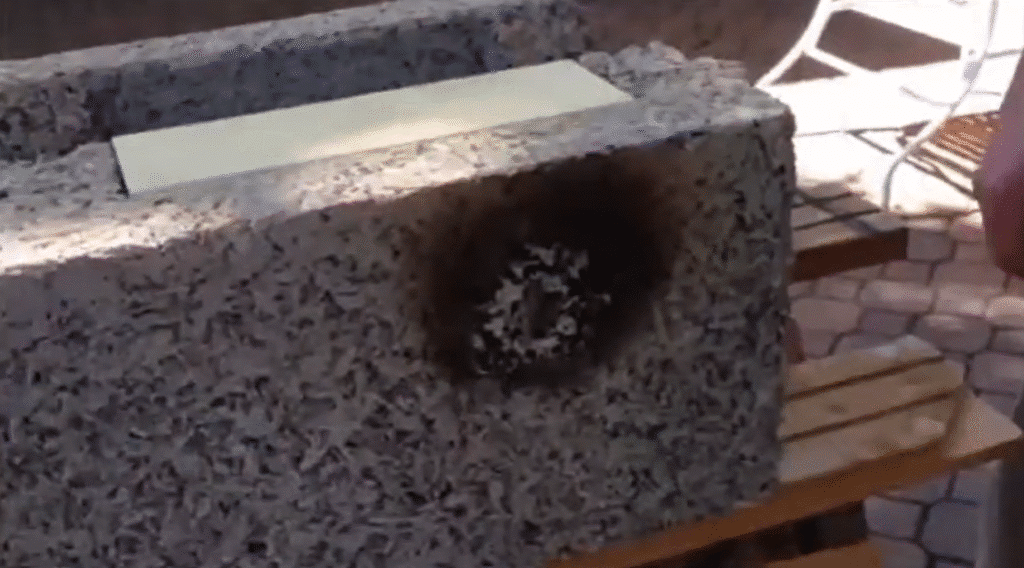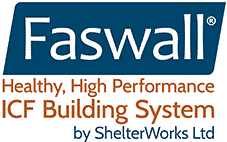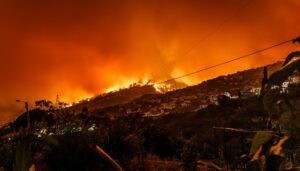Faswall is One of the Best Fire Resistant Building Materials With a Fire Rating of 4+ Hours
Faswall is One of the Best Fire Resistant Building Materials
No Material Makes a "Fire-Proof Home", but Faswall Walls Come Close
No Material makes a "Fire-Proof Home", but Faswall Walls come close
FEMA Home Builder's Guide to Construction in Wildfire Zones
FEMA Home Builder's Guide to Construction in Wildfire Zones
Fire Concerns Lead California Faswall Customer to Do His Own Testing
In the western United States and Canada, where much of the region is in a historic drought, we are very concerned about forest fires. John and Patti O’Connell, who were interested in building a Faswall home, were also concerned about the fire resistance of the blocks. So John did his own unscientific test, which you can see in this video.

Basically, John took a propane torch and held the flame directly against a Faswall block for two minutes. The direct heat burned a tiny hole in the block, and made the insulating insert in the block smoke a little bit, but it didn’t catch on fire. In fact, at the end of the test, John was able to lay his hand on top of the block because it had barely gotten warm.
“I don’t think you have to worry about forest fires,” he says. Especially since, as he says a moment later, “This is obviously a hell of a lot more heat than any forest fire is going to deliver.”
Santa Rosa Fire Resistant Building
We talk to a DIY homeowner, building a European style villa in Santa Rosa, California, about his experience working with Faswall block and discuss how Faswall’s fire resistant properties, (RH4 four-hour fire rating) can help affected homeowners rebuild after the October 2017 wildfires.
See Why These Customers Chose to Rebuild with Faswall After a Fire
Single Family Home Lost to Fire - Rebuilt With Faswall ICCF
Read More“The year after we finished building our house, we used that construction process to very favorably affect our insurance situation.“ “[Our insurance agent] (instead of canceling our policy as they previously threatened) would instead be issuing a new policy to us with 22% lower premiums, and 75% higher coverage. They said that [they are] "Happy to insure a safe home".”
Ryan Nevins, Customer who Rebuilt Their Home with Faswall After a Wildfire
Ready to Rebuild After a Fire?
Learn more about Builders Using Faswall in Fire Areas:
A home of one of our builders sustained an internal fire, which destroyed the inside belongings. But the wall system endured, making it possible to rebuild with the original Faswall® walls intact.
You May Also be Interested In...
I Want To Get Started
Request Your Free Download “Get Started” Package:
Includes: Design Ideas, Product Data Sheet, Block Pricing, Technical and Installation Info, Engineering Details
Frequently Asked Questions:
What is Faswall?
Faswall green building blocks are made with a special blend of wood and concrete. These 100% organic (and 60% recycled) materials make it an ideal building product for many reasons. First, Faswall is a lightweight fire-resistant material, meaning that Faswall’s blocks are engineered to be relatively light compared to solid concrete masonry, while still delivering a 4‑hour fire rating. Faswall creates homes, offices, warehouses and other buildings that are extremely energy efficient. Faswall green building blocks are a great place to begin if you want a home with superior indoor air quality. Their ability to resist mold and mildew make them ideal for wine storage, beer breweries and many other uses.
Faswall and Energy Efficiency
Click Here to Learn More
Faswall and Mold Resistance
Click Here to Learn More
Faswall For Basements and Foundations
Click Here to Learn More
Faswall For Commercial Buildings
Click Here to Learn More
How long will a house made with Faswall's healthy ICF blocks last?
Faswall Blocks are extremely durable. The blocks are very strong and create structures that can easily stand for hundreds of years. Termites, carpenter ants, and other pests have a hard time eating into them because the cement outer layer completely impregnates the blocks with a mineralized coating.
What is the difference between fire proof walls and fire resistant walls?
No material is truly “fire proof” under all conditions, but “fire proof walls” is often used colloquially to mean walls that can resist fire for a long duration without failing. In technical use, we prefer fire-resistant walls (walls built with materials and systems tested to withstand fire) (e.g. 1, 2, 3, or 4‑hour fire ratings). Faswall’s system is rated for 4 hours with zero flame spread and no smoke development.
Are Faswall blocks “fire proof blocks”?
Faswall blocks are engineered to be extremely fire resistant. In testing, the wall assembly achieved a 4‑hour fire rating, with no flame spread or smoke. While we don’t claim absolute “fire proof,” in practice Faswall blocks outperform most conventional masonry or wood assemblies.
What is the best material to build a fire proof home?
There is no single perfect material, but some materials are much better than others. Key attributes include: non‑combustibility, thermal stability, low smoke, and structural integrity under fire. Examples of top-performing fire resistant materials are: concrete, masonry, mineral wool, certain types of insulated concrete form (ICF) systems (like Faswall), and naturally fire resistant materials.
Faswall offers a composite block (wood/cement core with a mineral matrix) that approaches the best balance of strength, insulation, and fire resistance.
What are natural fire resistant materials and how do they compare?
Natural fire resistant materials are those derived from earth, minerals, or non‑combustible natural fibers. Examples include clay, stone, adobe, rammed earth, and some types of plaster mixes. These materials resist ignition well, but may lack in structural flexibility, insulation, or ease of installation compared to engineered systems.
Faswall leverages a natural composite of wood and inorganic mineral impregnation to gain fire resistance while retaining structural performance.
How does fire resistant house design complement fire resistant materials?
Material alone isn’t enough. Good fire resistant house design integrates:
Adequate spacing from combustibles (defensible space)
Fire‑resistive roof and eaves
Non‑combustible cladding
Firewalls and compartmentalization
Proper detailing at joints and penetrations
Venting systems designed to limit fire spread
Even the best fire-resistant materials need to be integrated within a holistic fire-conscious design to optimize safety.
Can a home built with Faswall really survive a fire?
Yes, there are documented cases where the interior furnishings and finishes were destroyed but the Faswall structure remained intact, allowing rebuilding without demolishing the shell. The blocks themselves do not burn or melt, and produce no toxic smoke under fire stress.
Will Faswall walls release toxic gases during a fire?
No. Faswall blocks are formulated so that under fire exposure they do not generate toxic smoke or gases.
Does using Faswall mean I don’t need any extra fire protection?
No. While Faswall provides very high fire resistance, best practice is still to combine it with complementary fire protection measures: fire‑resistive roofs, noncombustible finishes, fire breaks, proper ventilation, and compartmentalization in the house design.


